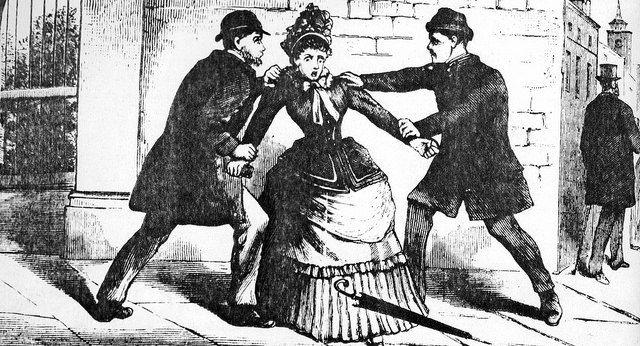Throughout my life, I’ve found that I tend to skeptically view offers of friendship from men.
My life experience has taught me that there is nearly always an element of attraction or sexual interest wrapped inside these overtures. And this isn’t ego: it’s not that I think all men are attracted to me. I just have a difficult time not hesitating when everything in my life has clearly demonstrated that men tend to confer a woman’s value based solely on attractiveness.
I’m sure there are men out there right now already vehemently denying this is the case. And maybe I’m wrong. But I can think of countless examples of men relating to me or women around me based solely on their perception of our worth.
Perhaps in the last couple of years, you’ve heard the term misogyny creep into conversations on society and politics. Misogyny can be defined as: an ingrained prejudice toward women (Oxford Dictionary). It’s so commonplace that we often don’t acknowledge that it’s happening, nor do we see how insidious these behaviors are to women. We just accept it as the way things are.
But I look back over my life, and I see misogyny written all over this invisible price tag that our patriarchal society has attached to women.
It’s when the male store clerk treats a young, attractive female customer as worthy of time and attention while disregarding customers who don’t meet that value criteria. It’s in the candidate selection process of many businesses where attractiveness can outweigh skills or qualifications. It’s wrapped inside of body shaming, slut shaming, and all of the double standards heaped on women.
To be a virgin but not a prude. To be experienced but not too experienced. To wear makeup but not too much. It’s even inside of the assumption that we wear makeup or dress up simply for the benefit of male appreciation. Or the idea that other women should be viewed as our competition.
Aging is a certainly a factor in it: Our value as women seems to be insignificant before puberty and after menopause. Young girls are ignored and thought to contribute little to society. To be seen but not heard is still considered a desirable attribute, and teachers still favor boys in the classroom. As we age, our value is decreased by marriage, being pregnant, raising children, and being “soccer moms.” Women who choose not to marry and have children are judged for those decisions as well.
And as we grow older, we’re not seen as attractive, and society tries to divorce us from our sexuality, telling us instead that we should strive to look younger to meet its standard of beauty.
But aging is far from the only factor. Our society continues to value our lives based on perceived attractiveness.
Misogyny thrives in a culture that still sees nothing wrong with beauty pageants for girls. Let’s think about this: girls being judged purely on attractiveness and competing with other girls for the honor of being perceived as the most beautiful. And yet parents sign their children up to be put on display for the judgment of others. Then the children get older, and we see nothing wrong with the superlatives conferred upon them in schools. Most Attractive. Best Smile. We relate to women based on their relationship with others: someone’s girlfriend, wife, mother.
We’ve participated in a society that places a price tag on our worth as human beings, and we’re paying for it. Our reproductive rights are still outside of our control, with politicians vying to take away our ability to choose when or if we’ll have families. We have states passing legislation to protect the future of rapists on college campuses rather than their victims. In seven U.S. states, rapists and their victims can be forced to share custody of children conceived through rape (Maryland, Alabama, Mississippi, Minnesota, North Dakota, Wyoming, and New Mexico).
There’s even a new trend called stealthing, where men remove condoms during sex without the consent of their partners. (By the way, men: this is considered sexual assault.)
In the past year, we’ve seen several rapists and sexual predators walk away with minimal punishment, and our country elected a president who has been accused by several women of sexual assault. There was even a recording released where he confirms his view of women as objects and his history of molesting them. Even though this was public knowledge before election day, he was still able to obtain enough electoral college votes (though not a voting majority) to rise to the highest office in our land. His favorite news network, Fox News, has seen a recent surge in their news anchors being accused of sexual harassment as well.
In light of our culture, it’s no wonder that I look askance at overtures from men.
When our whole lives are defined by that invisible price tag, it’s difficult to believe that a man in this culture can view a woman as a whole person, complete and worthy of time, attention, and courtesy without the qualifiers of physical beauty or perceived sexuality. It’s hard to believe because our society is not teaching men to value women on any other criteria, and their own value is just assumed to make the grade.
So how do we dismantle the misogyny that’s so prevalent in our culture? What can we do on an individual level to create change in those harmful interactions where it seems that women’s value is conferred solely on the basis of perceived attractiveness?
We can begin to treat all people as if they are valuable and worthy of our consideration. All. Without regard to gender or gender identity, race, class, sexual orientation, nationality, religion, or political affiliation.
We can judge human beings on how they treat others rather than the physical characteristics of their genetics. We can automatically assume that all human beings have value, and then let their character define them.
We can also stand against the devaluation of humanity by speaking out against misogyny. When we notice body shaming or slut shaming, we can speak up. We can stop entering our daughters into beauty pageants or teaching them that other girls are their competition. We can stop telling girls they are pretty before we tell them that they are smart or kind or strong.
We can teach our boys about consent and that consent isn’t a one-time agreement. We can tell them that it’s never appropriate to touch someone without their consent or to catcall or make sexual remarks, even in jest. We can teach our children by setting an example with our own behaviors and the way we talk about women. We can make sure our homes aren’t perpetuating rape culture.
We can stop treating women as if each of us have an invisible price tag assigning our value. Because we’re all of value. And it’s time we teach ourselves and our children a new way of thinking and behaving—because the old way is poisoning all of those wives and mothers and daughters society claims to revere.
~
Author: Crystal Jackson
Image: Paul Townsend/Flickr
Editor: Catherine Monkman












Read 41 comments and reply